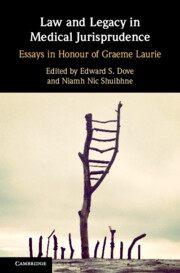Book contents
- Law and Legacy in Medical Jurisprudence
- Law and Legacy in Medical Jurisprudence
- Copyright page
- Contents
- Contributors
- Foreword
- Preface
- Table of Cases
- Table of Legislation
- Abbreviations
- Introduction
- 1 ‘Doing’ Medical Law and Ethics
- 2 A Philosopher Looks at ‘Law and Medical Ethics’
- 3 Thinking Outside the Box
- 4 The Public Interest in Health Research
- 5 Taking the Legacy Forward
- 6 On the Importance of Impact on Policy and Legacy
- 7 Breathing Life into Law
- 8 Biomedical Research Policy
- 9 The Burden of History
- 10 Body Parts and Baleful Stars?
- 11 The Legacy of the Warnock Report
- 12 ‘Only Time Will Tell’
- 13 Integrating the Biological and the Technological
- 14 UK Biobank and the Legal Regulation of Genetic Research
- 15 Overcoming Regulatory Impasse in Stem Cell Research and Advanced Therapy Medicines in Argentina through Shared Norms and Values
- 16 Institutions, Interpretive Communities and Legacy in Decision-Making
- 17 Towards a New Privacy
- 18 A Tale of Two Legacies
- Afterword
- Index
9 - The Burden of History
How Past Scandals Have Shaped the Future Governance of Human Tissue and Health Data
Published online by Cambridge University Press: 23 December 2021
- Law and Legacy in Medical Jurisprudence
- Law and Legacy in Medical Jurisprudence
- Copyright page
- Contents
- Contributors
- Foreword
- Preface
- Table of Cases
- Table of Legislation
- Abbreviations
- Introduction
- 1 ‘Doing’ Medical Law and Ethics
- 2 A Philosopher Looks at ‘Law and Medical Ethics’
- 3 Thinking Outside the Box
- 4 The Public Interest in Health Research
- 5 Taking the Legacy Forward
- 6 On the Importance of Impact on Policy and Legacy
- 7 Breathing Life into Law
- 8 Biomedical Research Policy
- 9 The Burden of History
- 10 Body Parts and Baleful Stars?
- 11 The Legacy of the Warnock Report
- 12 ‘Only Time Will Tell’
- 13 Integrating the Biological and the Technological
- 14 UK Biobank and the Legal Regulation of Genetic Research
- 15 Overcoming Regulatory Impasse in Stem Cell Research and Advanced Therapy Medicines in Argentina through Shared Norms and Values
- 16 Institutions, Interpretive Communities and Legacy in Decision-Making
- 17 Towards a New Privacy
- 18 A Tale of Two Legacies
- Afterword
- Index
Summary
A ubiquitous issue in medical law is how to strike the balance between affording individuals freedom and keeping communities safe. Legislators strive to do this by examining existing practices (constantly fluctuating due to evidence and experience) and anticipating future ones (notoriously difficult); it is a sophisticated exercise in the context of medicine because of the field’s proximity to science and innovation. The ingrained culture of self-regulation and professional ethos-based governance also obscures practices and emerging trends in a way that frustrates appropriate public debate and timely legislator intervention. This creates a trigger for explosive decompression of public opinion where practices are no longer socially acceptable (or, indeed, never were) and where emerging biomedical practices are poorly communicated or implemented. The resulting scandals create a social legacy which drives the political context of subsequent legislation. This chapter looks at two such events – the Alder Hey organ retention scandal and the care.data controversy – and analyses the legacy they created for the future regulation of the use of human tissues and data for biomedical research.
- Type
- Chapter
- Information
- Law and Legacy in Medical JurisprudenceEssays in Honour of Graeme Laurie, pp. 190 - 208Publisher: Cambridge University PressPrint publication year: 2022



